英语第一单元比较级和最高级的用法
比较级和最高级的用法:修饰量词
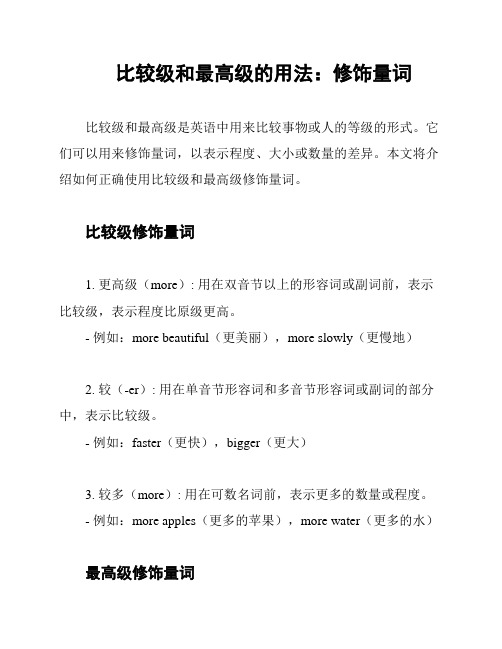
比较级和最高级的用法:修饰量词比较级和最高级是英语中用来比较事物或人的等级的形式。
它们可以用来修饰量词,以表示程度、大小或数量的差异。
本文将介绍如何正确使用比较级和最高级修饰量词。
比较级修饰量词1. 更高级(more): 用在双音节以上的形容词或副词前,表示比较级,表示程度比原级更高。
- 例如:more beautiful(更美丽),more slowly(更慢地)2. 较(-er): 用在单音节形容词和多音节形容词或副词的部分中,表示比较级。
- 例如:faster(更快),bigger(更大)3. 较多(more): 用在可数名词前,表示更多的数量或程度。
- 例如:more apples(更多的苹果),more water(更多的水)最高级修饰量词1. 最高级(the most): 用在双音节以上的形容词或副词前,表示最高级,表示程度最高。
- 例如:the most beautiful(最美丽),the most slowly(最慢地)2. 最(-est): 用在单音节形容词和多音节形容词或副词的部分中,表示最高级。
- 例如:fastest(最快),biggest(最大)3. 最多(the most): 用在可数名词前,表示最多的数量或程度。
- 例如:the most apples(最多的苹果),the most water(最多的水)注意事项:- 比较级和最高级通常用于比较两个或多个事物或人的差异。
- 对于双音节以上的形容词和副词,使用more和the most来表示比较级和最高级。
- 对于单音节形容词和副词,使用-er和-est来表示比较级和最高级。
- 对于可数名词,使用more和the most表示更多或最多的数量或程度。
希望本文对比较级和最高级修饰量词的正确使用有所帮助。
比较级和最高级的用法

比较级和最高级的用法比较级和最高级是英语中两种重要的形容词、副词变化形式。
它们是用来表示物品、人或者概念等在质量、数量、程度等方面的大小关系的。
掌握比较级和最高级有助于英语学习者在表达中更准确、自然地表达自己的意思。
一、比较级的用法一、表示两个人或者物之间的大小关系比较级用来表示两者之中一个具有更强烈的特点或者更多的特点。
通常来说,比较级由“+er”或者由“more+形容词或者副词原形”。
1. +er的比较级形式+er的形式是唯一的,适用于单音节、双音节以及一些多音节词的形容词和副词。
例如:- I am taller than my sister.- This dress is cheaper than that.- She runs faster than him.2. more+形容词/副词原形more的形式应用于多音节的形容词和副词,它是无限制的形式。
例如:- This book is more interesting than the one I read last week.- She speaks more confidently than her friends.- The boy is more mature than others in his class.二、使用比较级进行比较1. 更多 than使用比较级的一个重要方面是来比较两个人或事物之间的差异。
通常使用“更多than”的形式来进行比较,如:- My sister has more friends than I do.- He exercises more frequently than I do.- She has more experience than I do in this field.2. 不如 than另一方面,比较级也可以使用“不如than”的形式来表示一个人或者物不如另一个人或物,如:- She is not as tall as her brother.- This restaurant is not as crowded as the other one.- Tom is not as smart as his friends.3. The -er, the -er可以通过使用“the + comparative形式 + the comparative形式”的结构来表示相应的效果随特定条件的增加/减少而增加/减少,例如:- The harder you study, the better your grades will be.- The more you practice, the better you will become.- The more you eat, the fatter you will get.4. nearly/hardly/barely/moderately等程度副词比较级还可以与程度副词一起使用,表示一定的程度。
比较级与最高级的用法与形式

比较级与最高级的用法与形式比较级和最高级是英语中用来比较两个或多个事物的形式。
它们主要用来表达事物之间的差异或者程度上的优劣。
在本文中,我们将详细探讨比较级和最高级的用法和形式。
一、比较级的用法和形式1. 形容词比较级的用法:形容词比较级用来比较两个事物的差异或程度上的优劣。
比较级的基本形式为:原形 + er。
例如:tall(高)- taller(更高)。
2. 副词比较级的用法:副词比较级同样用来比较两个事物的差异或程度上的优劣。
比较级的基本形式为:原形 + er。
例如:quickly(快速地)- more quickly (更快)。
3. 比较级的用法:比较级在句子中通常需要与than(比)一起使用,以表达两个事物之间的比较。
例如:She is taller than her sister.(她比她妹妹高)。
4. 比较级的修饰语:比较级可以添加修饰语来增强比较的程度。
常见的修饰语有much (更多)、far(更远)、a little(有点)等。
例如:He is much taller than me.(他比我高得多)。
5. 特殊情况:对于以辅音字母+y结尾的形容词和副词,将y变为i再加上er。
例如:happy(快乐)- happier(更快乐)。
二、最高级的用法和形式1. 最高级的用法:最高级用来比较三个或三个以上的事物,以表达其中一项在程度上的优势。
最高级通常与in(在……中)一起使用。
例如:He is the tallest student in the class.(他是班上最高的学生)。
2. 最高级的形式:最高级的基本形式为:the + 形容词或副词的最高级形式。
形容词和副词最高级的构成方式与比较级类似,通常在原形的基础上加上est。
例如:tall(高)- the tallest(最高)。
3. 最高级的修饰语:最高级也可以添加修饰语来增强程度。
同比较级一样,常见的修饰语有much(更多)、far(更远)、by far(最远)等。
比较级表最高级的用法归纳
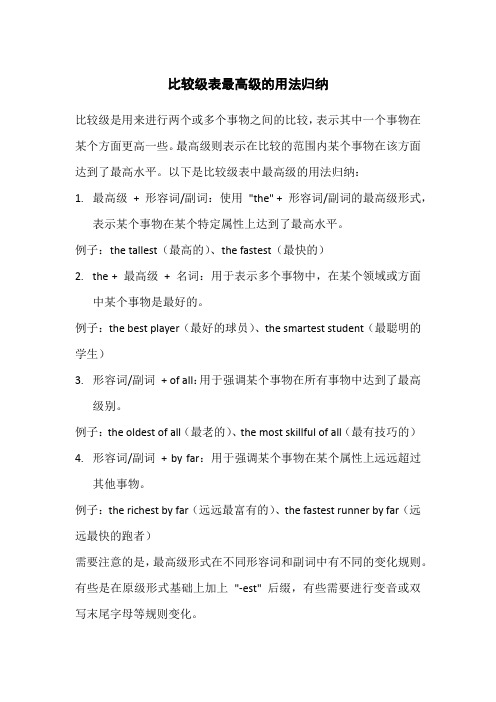
比较级表最高级的用法归纳
比较级是用来进行两个或多个事物之间的比较,表示其中一个事物在某个方面更高一些。
最高级则表示在比较的范围内某个事物在该方面达到了最高水平。
以下是比较级表中最高级的用法归纳:
1.最高级+ 形容词/副词:使用"the" + 形容词/副词的最高级形式,
表示某个事物在某个特定属性上达到了最高水平。
例子:the tallest(最高的)、the fastest(最快的)
2.the + 最高级+ 名词:用于表示多个事物中,在某个领域或方面
中某个事物是最好的。
例子:the best player(最好的球员)、the smartest student(最聪明的学生)
3.形容词/副词+ of all:用于强调某个事物在所有事物中达到了最高
级别。
例子:the oldest of all(最老的)、the most skillful of all(最有技巧的)4.形容词/副词+ by far:用于强调某个事物在某个属性上远远超过
其他事物。
例子:the richest by far(远远最富有的)、the fastest runner by far(远远最快的跑者)
需要注意的是,最高级形式在不同形容词和副词中有不同的变化规则。
有些是在原级形式基础上加上"-est" 后缀,有些需要进行变音或双写末尾字母等规则变化。
同时,需要根据具体语境和比较对象选择合适的最高级表达方式。
这些用法可以根据实际需要进行灵活运用。
英语语法比较级和最高级用法知识点归纳总结
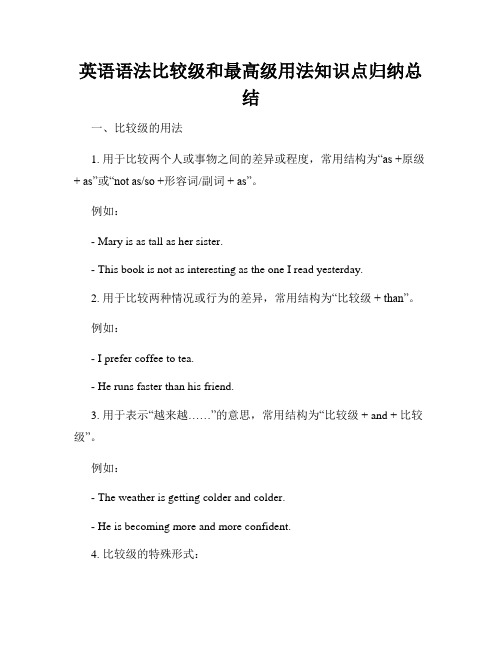
英语语法比较级和最高级用法知识点归纳总结一、比较级的用法1. 用于比较两个人或事物之间的差异或程度,常用结构为“as +原级+ as”或“not as/so +形容词/副词+ as”。
例如:- Mary is as tall as her sister.- This book is not as interesting as the one I read yesterday.2. 用于比较两种情况或行为的差异,常用结构为“比较级+ than”。
例如:- I prefer coffee to tea.- He runs faster than his friend.3. 用于表示“越来越……”的意思,常用结构为“比较级 + and + 比较级”。
例如:- The weather is getting colder and colder.- He is becoming more and more confident.4. 比较级的特殊形式:- 以字母e结尾的形容词,去掉e再加-er。
- 以重读闭音节结尾的单音节形容词和部分双音节形容词,直接加-er。
- 以“辅音字母+y”结尾的形容词,把y变成i再加-er。
例如:- nice → nicer- big → bigger- happy → happier二、最高级的用法1. 用于三个或三个以上人或事物之间的比较,表示最高程度,常用结构为“the + 最高级”。
例如:- She is the tallest girl in the class.- This is the most interesting book I've ever read.2. 最高级的特殊形式:- 以字母e结尾的形容词,去掉e再加-st。
- 以重读闭音节结尾的单音节形容词和部分双音节形容词,直接加-st。
- 以“辅音字母+y”结尾的形容词,把y变成i再加-est。
例如:- nice → nicest- big → biggest- happy → happiest三、比较级和最高级的不规则形式1. 比较级和最高级的不规则形式:good → better → best, bad → worse → worst, many/much → more → most, little → less→ least。
归纳英语比较级和最高级的用法
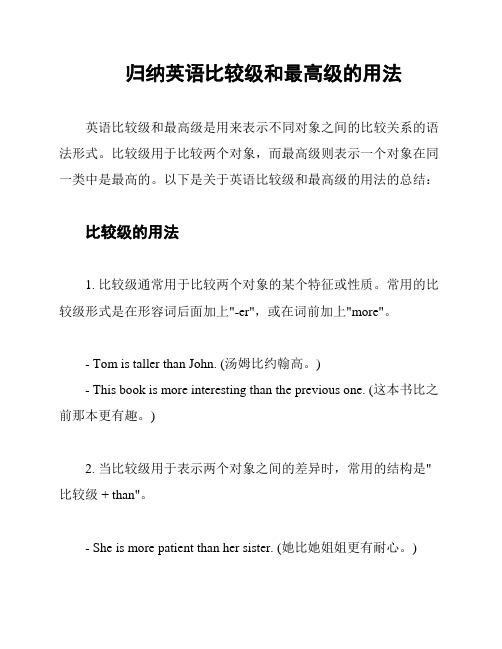
归纳英语比较级和最高级的用法英语比较级和最高级是用来表示不同对象之间的比较关系的语法形式。
比较级用于比较两个对象,而最高级则表示一个对象在同一类中是最高的。
以下是关于英语比较级和最高级的用法的总结:比较级的用法1. 比较级通常用于比较两个对象的某个特征或性质。
常用的比较级形式是在形容词后面加上"-er",或在词前加上"more"。
- Tom is taller than John. (汤姆比约翰高。
)- This book is more interesting than the previous one. (这本书比之前那本更有趣。
)2. 当比较级用于表示两个对象之间的差异时,常用的结构是"比较级 + than"。
- She is more patient than her sister. (她比她姐姐更有耐心。
)- The second movie is better than the first one. (第二部电影比第一部好。
)3. 比较级也可以用来表示变化或增减的程度。
- Prices are getting higher and higher. (价格越来越高。
)最高级的用法1. 最高级用于表示某一类中的一个对象在某个特征上是最高的。
通常在形容词前加上"the",再加上"-est",或在词前加上"the most"。
- He is the tallest boy in the class. (他是班级里最高的男孩。
)- This is the most challenging task I have ever encountered. (这是我遇到过最具挑战性的任务。
)2. 最高级也可以用于表示程度或范围。
- They are the most successful band in the world. (他们是世界上最成功的乐队。
比较级与最高级用法
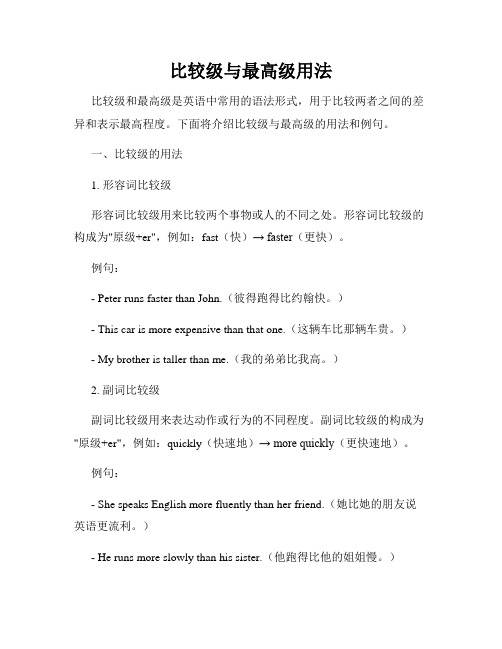
比较级与最高级用法比较级和最高级是英语中常用的语法形式,用于比较两者之间的差异和表示最高程度。
下面将介绍比较级与最高级的用法和例句。
一、比较级的用法1. 形容词比较级形容词比较级用来比较两个事物或人的不同之处。
形容词比较级的构成为"原级+er",例如:fast(快)→ faster(更快)。
例句:- Peter runs faster than John.(彼得跑得比约翰快。
)- This car is more expensive than that one.(这辆车比那辆车贵。
)- My brother is taller than me.(我的弟弟比我高。
)2. 副词比较级副词比较级用来表达动作或行为的不同程度。
副词比较级的构成为"原级+er",例如:quickly(快速地)→ more quickly(更快速地)。
例句:- She speaks English more fluently than her friend.(她比她的朋友说英语更流利。
)- He runs more slowly than his sister.(他跑得比他的姐姐慢。
)- They arrived earlier than expected.(他们比预计的时间早到。
)3. 不规则比较级有一些形容词和副词的比较级形式是不规则的,需要单独记忆。
例如:good(好)→ better(更好),bad(坏)→ worse(更糟)。
例句:- The weather today is better than yesterday.(今天的天气比昨天好。
)- Her performance in the exam was worse than expected.(她在考试中的表现比预期的要糟糕。
)二、最高级的用法1. 形容词最高级形容词最高级用来表达三个或三个以上事物或人之间的最高程度。
英语比较级和最高级的用法归纳
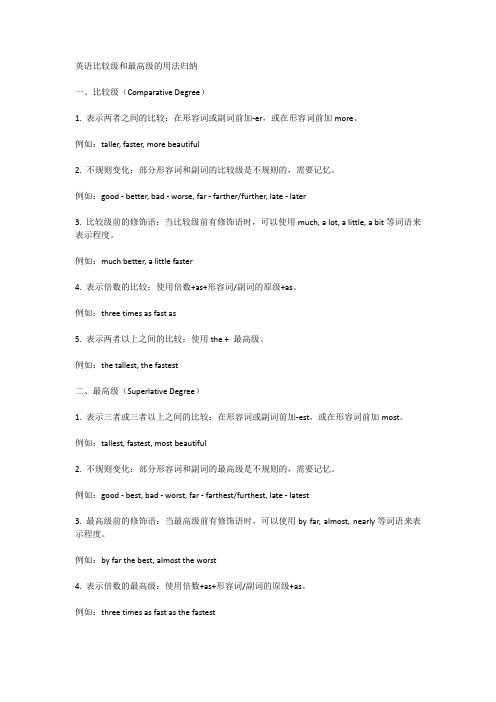
英语比较级和最高级的用法归纳一、比较级(Comparative Degree)1. 表示两者之间的比较:在形容词或副词前加-er,或在形容词前加more。
例如:taller, faster, more beautiful2. 不规则变化:部分形容词和副词的比较级是不规则的,需要记忆。
例如:good - better, bad - worse, far - farther/further, late - later3. 比较级前的修饰语:当比较级前有修饰语时,可以使用much, a lot, a little, a bit等词语来表示程度。
例如:much better, a little faster4. 表示倍数的比较:使用倍数+as+形容词/副词的原级+as。
例如:three times as fast as5. 表示两者以上之间的比较:使用the + 最高级。
例如:the tallest, the fastest二、最高级(Superlative Degree)1. 表示三者或三者以上之间的比较:在形容词或副词前加-est,或在形容词前加most。
例如:tallest, fastest, most beautiful2. 不规则变化:部分形容词和副词的最高级是不规则的,需要记忆。
例如:good - best, bad - worst, far - farthest/furthest, late - latest3. 最高级前的修饰语:当最高级前有修饰语时,可以使用by far, almost, nearly等词语来表示程度。
例如:by far the best, almost the worst4. 表示倍数的最高级:使用倍数+as+形容词/副词的原级+as。
例如:three times as fast as the fastest5. 表示所有事物中的最高程度:使用on earth, in the world等词语。
- 1、下载文档前请自行甄别文档内容的完整性,平台不提供额外的编辑、内容补充、找答案等附加服务。
- 2、"仅部分预览"的文档,不可在线预览部分如存在完整性等问题,可反馈申请退款(可完整预览的文档不适用该条件!)。
- 3、如文档侵犯您的权益,请联系客服反馈,我们会尽快为您处理(人工客服工作时间:9:00-18:30)。
英语比较级和最高级的用法一、形容词、副词的比较级和最高级的构成规则1.一般单音节词和少数以-er,-ow结尾的双音节词,比较级在后面加-er,最高级在后面加-est;(1)单音节词如:small→smaller→smallest short→shorter→shortesttall→taller→tallest great→greater→greatest(2)双音节词如:clever→cleverer→cleverest narrow→narrower→narrowest2.以不发音e结尾的单音节词,比较在原级后加-r,最高级在原级后加-st;如:large→larger→largest nice→nicer→nicest able→abler→ablest3.在重读闭音节(即:辅音+元音+辅音)中,先双写末尾的辅音字母,比较级加-er,最高级加-est;如:big→bigger→biggest hot→hotter→hottest fat→fatter→fattest4.以“辅音字母+y”结尾的双音节词,把y改为i,比较级加-er,最高级加-est;如:easy→easier→easiest heavy→heavier→heaviestbusy→busier→busiest happy→happier→happiest5.其他双音节词和多音节词,比较级在前面加more,最高级在前面加most;如:beautiful→more beautiful→most beautifuldifferent→more different→most differenteasily→more easily→most easily注意:(1)形容词最高级前通常必须用定冠词the,副词最高级前可不用。
例句:The Sahara is the biggest desert in the world.(2) 形容词most前面没有the,不表示最高级的含义,只表示“非常”。
It is a most important problem.=It is a very important problem.6.有少数形容词、副词的比较级和最高级是不规则的,必须熟记。
如:good→better→best well→better→bestbad→worse→worst ill→worse→worstold→older/elder→oldest/eldestmany/much→more→most little→less→leastfar →further/farther→furthest/farthest二、形容词、副词的比较级和最高级的用法1.“A + be +形容词比较级+ than + B”意思为“A比B更……”。
如:This tree is taller than that one. 这棵树比那棵树高。
注意:①在含有连词than的比较级中,前后的比较对象必须是同一范畴,即同类事物之间的比较。
②在比较级前面使用much,表示程度程度“强得多”。
如:A watermelon is much bigger than an apple.③very, quite一般只能修饰原级,不能修饰比较级。
2.“比较级+ and + 比较级”或“more and more +原级”表示“越来越……”如:It becomes warmer and warmer when spring comes.春天来了,天气变得越来越暖和了。
It is getting cooler and cooler.天气越来越凉爽。
The wind became more and more heavily.风变得越来越大。
Our school is becoming more and more beautiful.我们的学校变得越来越美丽。
3.在含有or的选择疑问句中,如果有两者供选择,前面的形容词要用比较级形式。
如:Who is taller,Tim or Tom? 谁更高,Tim还是Tom?4. “the +比较级……, the+比较级”,表示“越……越……”。
The more money you make, the more you spend.钱你赚得越多,花得越多。
The sooner,the better.越快越好。
5. 表示倍数的比较级用法:①. A is …times the size /height/length/width of B.如:The new building is three times the height of the old one.这座新楼比那座旧楼高三倍。
(新楼是旧楼的四倍高)②. A is …times as big /high/long/wide/large as B.如:Asia is four times as large as Europe.亚洲是欧洲的四倍大。
(亚洲比欧洲大三倍)③. A is …times larger /higher/longer/wider than B.如:Our school is twice bigger than yours.我们学校比你们学校大两倍。
6.形容词、副词的最高级形式主要用来表示三者或三者以上人或事物的比较,表示“最……”的意思。
句子中有表示范围的词或短语。
如:of the three, in our class等等。
如:He is the tallest in our class.他在我们班里是最高的。
7."否定词语+比较级“,”否定词语+ so…as"结构表示最高级含义。
Nothing is so easy as this.=Nothing is easier than this.=This is the easiest thing.8. 比较级与最高级的转换:Mike is the most intelligent in his class.Mike is more intelligent than any other student in his class7.修饰比较级和最高级的词1)可修饰比较级的词①.a bit, a little, rather, much, far, by far, many, a lot, lots, a great deal, any, still, even等。
②. 还可以用表示倍数的词或度量名词作修饰语。
③. 以上词(除by far)外,必须置于比较级形容词或副词的前面。
注意:使用最高级要注意将主语包括在比较范围内。
(错) Tom is the tallest of his three brothers.(对) Tom is the tallest of the three brothers.2)下列词可修饰最高级:by far, far, much, mostly, almost.This hat is nearly / almost the biggest.注意:a. very可修饰最高级,但位置与much不同。
This is the very best.This is much the best.b. 序数词通常只修饰最高级。
Africa is the second largest continent.8.要避免重复使用比较级。
(错) He is more cleverer than his brother.(对) He is more clever than his brother.(对) He is cleverer than his brother.9.要避免将主语含在比较对象中。
(错) China is larger that any country in Asia.(对) China is larger than any other country in Asia.10.要注意对应句型,遵循前后一致的原则。
The population of Shanghai is larger than that of Beijing.It is easier to make a plan than to carry it out.11.要注意冠词的使用,后有名词的时候,前面才有可能有名词。
比较:Which is larger, Canada or Australia?Which is the larger country, Canada or Australia?She is taller than her two sisters.She is the taller of the two sisters.比较级和最高级的用法1. 两者相比(甲=乙),用“as+原级+as”表示Tom is as tall as Mike.2. 两者相比(甲〈乙),用“not as(so) +原级+as”或"less than"表示I didn’t do my homework so(as) carefully as you.The picture is less attractive than that one.3. 两者相比(甲〉乙),用“比较级+than”表示Our city is more beautiful than any other city in our country.注意:1) 为了避免重复,在从句中常用one, that, those等词来代替前面提过的名词。
The weather here is warmer than that of Shanghai.The radios made in our factory are better than those in your factory.3 )如果形容词作定语修饰一个单数可数名词,一般将不定冠词a/an放在形容词之后。
Our neighbour has _____ ours.A. as a big house asB. as big a house asC. the same big house asD. house the same big as4 )比较级前一般不用冠词,但若表示“两者中较……时”。
比较级前要加定冠词。
若比较级后有名词,常在比较级前加不定冠词,表示泛指。
E.g. 他是两者中较高的一个He is the taller of the two.她唱得真动听!我可从未听过比这更好的嗓音了。
How beautifully she sings! I have never heard a better voice.4. 三者或三者以上相比,表示最高级时,用“the +最高级”的结构表示,这种句式一般常有表示比较范围的介词短语。
